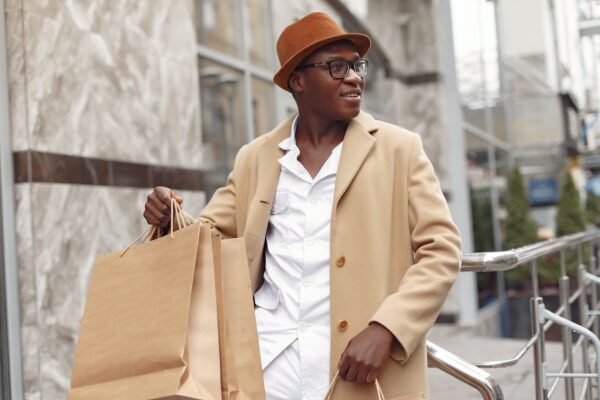Brand identity is shifting African Americans’ retail shopping habits and making the luxury fashion market more aware of the purchasing power of Black consumers.

The revenue of the luxury fashion market was nearly $108.4 billion in 2021, and Statista Consumer Market Outlook estimates that by 2025, the market will create revenue of $132.8 billion.
Legacy luxury brands have encapsulated runways, premiere fashion shows and mainstream media for decades, creating a superior status quo of exclusivity that was only limited to the rich and famous. In doing so, high-end retailers left out one of the largest demographic of buyers: Black shoppers.
“The buying power estimates and differences in spending by race and/or ethnicity suggest that as the nation’s consumer market becomes more diverse, advertising, products, and media must be tailored to each market segment,” wrote Jeff Humphreys, director of the Selig Center for Economic Growth at the University of Georgia, in the “Multicultural Economy 2021” report that studied the buying power of ethnic groups.
Even as corporate interest grows to tap into the variety of ethnic groups’ spending habits, Humphreys, who first published the report in 1990, says the interest of Black consumers still outpaces other groups.
“The African-American market has reached critical mass – it’s well established and very widespread geographically,” said Humphreys. The majority of calls that I get from corporations are still for African Americans.”
Fashion often has been influenced by fashion trends in Black communities as well as from the world of hip-hop. But oftentimes, while these trends are picked up, there is no monetary relationship that benefits Black trendsetters.
According to a McKinsey & Company study, nearly 45 percent of consumers in the United States agree that companies should pledge to support Black-owned brands, suppliers and vendors, while 68 percent say that their social values shape their shopping choices.
The expression of social, cultural and economic realities of Black people became even more apparent following the murder of George Floyd. Black consumers vocalized their anger and demonstrated a unified front by ensuring Black businesses benefited from from Black consumer dollars, prompting mainstream companies from various sectors to pledge changes in hiring practices and funding Black- owned and operated small businesses.
“If you feel like you’re under attack or a group that you belong to is, you will defend yourself by wanting to move closer to signifiers of that group,” said Tari Dagog-Jack, an assistant marketing professor at the University of Georgia. “We will often use brands to reimagine our self-identity that we want to convey to others.”
A survey found that Black consumers are 20 percent more likely than the overall population to “pay extra for a product that is consistent with the image they want to convey,” and 31 percent more likely to spend $500 or more on a handbag.
Righting Wrongs
Luxury brands and designers from apparel to the spirits industry have underestimated and even devalued Black consumers as part of their customer base. Tommy Hilfiger tarnished his reputation after allegedly saying that he didn’t want Black people, or other racially diverse people, to buy his clothes, leading many to boycott the brand.
An offhanded comment by the head of Cristal champagne in the early 2000s received widespread criticism after he was asked about rappers like Jay-Z drinking the $300 bottle and referencing the brand in the videos.
“We can’t forbid people from buying it,” said Frederic Rouzaud in an interview with The Economist in 2006. “I’m sure Dom Pérignon or Krug would be delighted to have their business” .
The comment, which Jigga found to be condescending, prompted him to pull the brand from his U.S. sports bars. Jay would later acquire the Armand de Brignac champagne brand for an undisclosed amount from Sovereign brands.
“Brands will always have a particular type of customer that they want, but many luxury brands have broadened the definition of what that target market looks like,” said Dagogo-Jack. “What might have been only a problematic statement two decades ago will get you a ton of negative attention.”
Retooling of Marketing Messaging
On numerous occasions, big companies from Dove to H&M have missed the mark on marketing to Black consumers with culturally insensitive ads. Even within the last five years, distasteful commercials and advertisements received an immense amount of consumer backlash. As Black consumers become more aware and integrated with local brands and Black designers in the luxury segment, Humphreys believes the effort of brands to put more authenticity into messaging to target Black consumers will be imperative.
“Competition for Black consumer dollars is much more intense, said Humphreys. “The one-size-fits-all approach is less productive than it used to be. A targeted message is no longer as unique as it was 10 to 20 years ago.”




